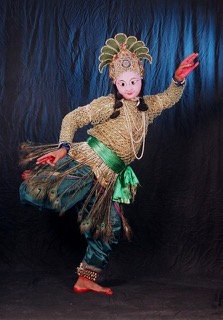
Dootghatotkacham
Das Stück des klassischen Tanz -Theaters Pratibha Sanskritik Sansthan aus Delhi
Zurück zu den Wurzeln!
Erleben Sie das Theater ein uralten Kultur. Die Geschichten wie die Tänze sind ca. 2000 Jahre alt. - Ein Spiel aus Versen, Farben und Rhythmen.
Das Sanskrit-Drama und Chhau-Tanz ist auf der UNESCO-Kulturerbe-Liste. Hier verschmelzen Theater, Kultur und Religion.
Zum Inhalt:
Dootghatotkacham geschrieben von Mahakavi Bhasa, ist ein Akt aus Mahabharata (eine altindisches religiöses Nationalepos)
„Verlust eines Sohnes brachte Arjun so viel Schmerz!
Stellt euch euer Leid nach dem Verlust von hundert Söhnen vor! Deshalb, bitte, zieht eure ganze Armee von der Kriegesfront zurück“. Mit diesen Worten wendet sich Ghatotakacha, ein Bote des indischen Gottes Krishna, an den Kriegsherren Kauvaraklan. Doch für diese Bitte erntet er Spott und Hohn. Es kommt zu einem heftigen Streit, der sich zu einer Fehde auswächst und viel Leid in die Familien der Streitenden sät. Erst der weise blinde König Dhitarashtra vermag diesem Streit ein Ende zu setzen.
GRUPPE:
Pratibha Sanskritik Sansthan
Pratibha Sanskritik Sansthan wurde 1987 von Bhumikeshwar Singh gegründet und seitdem geleitet. Es ist eine gemeinnützige Organisation, spezialisiert in verschiedenen Arten der darstellenden Künste, wie Chhau-Tanz, Odissi-Tanz, Drama und Pantomime. Die Institution gehört zu Indian Council of Cultural Relation. Das Hauptziel von Pratibha Sanskritik Sansthan ist mit Sanskrit Stücken in Chau Stil zu experimentieren, mit Berücksichtigung von allen in Nativ Shastra beschriebenen Elementen. Pratibha Sanskritik Sansthan ist die einzige von wichtigeren Institutionen in Nordindien, die bewahrt, praktiziert, lehrt und führt auf die traditionelle klassische Sanskrit-Dramen. Sanskrit-Drama und Chhau-Tanz ist auf der UNESCO-Kulturerbe-Liste. Pratibha Sanskritik Sansthan nahm teil an vielen internationalen Festivals in Italien, Deutschland, Russland und organisiert selbst internationale Festivals.
About The Play: Dootghatotkacham
The play Dootghatotkacham written by Mahakavi Bhasa, is an act from Mahabharata (Ancient Indian Epic). After Abhimanyu’s death in the bloody war, Ghatotakacha goes to the Kaurava clan as Krishna’s envoy carrying his message. “The loss of one son has caused so much pain and agony to Arjun. Imagine your suffering after loosing a hundred sons! Therefore, please withdraw your entire army from the war front.” Making fun of Ghatotakacha; Duryodhana, Dushshasan and Shakuni satirically comment on his demon clan. To this Ghatotakacha retorts saying, “You people are even meaner than the demons”. They don’t burn alive their brothers while asleep and never offend their brother’s wife. They could never even think of killing their own son.” The dialogue between Ghatotakacha and Duryodhana aggravates into a heated argument and finally a feud that is put to rest only by Dhritarashtra’s intervention.
Director’s Note Presently, it is quite challenging to perform Sanskrit plays. Written centuries ago by the master poet Bhasa, Dootghatotakacham is based on the life incidents of the demon son Ghatotakacha as described in Mahabharata. Like his other plays, Bhasa established dramatic satire, just partly in this play. Humanism of the demon clan is posited against the inhuman and evil spirit of human nature. Its is an attempt to make the use of Indian dance style Chhau work together to reach the essence of Bhasa’s writing and imagination in this performance.
Pratibha Sanskritik Sansthan
Pratibha Sanskritik Sansthan was established in 1987, Shri Bhumikeshwar Singh is the Founder/Director. It is a non-profitable organization working in various fields of performing arts such as Chhau Dance, Odissi Dance, Drama and Mime. The institution is also empanelled in Indian Council of Cultural Relation (I.C.C.R.).
The main objective of PSS is to experiment Sanskrit plays in Chhau style by using all the elements described in Natya Shastra. Pratibha Sanskritik Sansthan is only main institution in North India which is preserving, practicing, teaching and performing Traditional Classical Sanskrit Drama since 1998. Sanskrit Drama and Chhau is also in UNESCO list of Intangible Cultural Heritage of India. P.S.S has participated in many international festivals like, Italy, Germany, Russia and also organizing International Festivals.